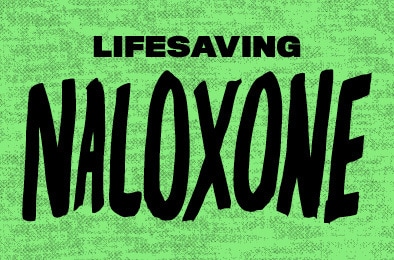At a glance
Naloxone is a lifesaving medicine that can reverse an opioid overdose. If you have naloxone, you can potentially save a life.

1. Naloxone saves lives
Naloxone, for example Narcan®, is a medicine that can help people who are overdosing on an opioid. Opioids include prescription medications, heroin, and fentanyl. Sometimes other drugs, including cocaine and methamphetamine, are mixed with fentanyl.
Naloxone can reverse the effects of an overdose from opioids, including:1
- Heroin
- Morphine
- Oxycodone (OxyContin®)
- Methadone
- Fentanyl
- Hydrocodone (Vicodin®)
- Codeine
- Hydromorphone
2. There are two ways to give naloxone
Naloxone can be administered by bystanders and is available as a(n):
Nasal Spray: Prefilled devices that spray medication into the nose.
Injectable: Medication (solution) given by injection into a muscle or under the skin.
For more information on the different forms of naloxone and how to use them please visit Lifesaving Naloxone.
3. Naloxone is safe
Naloxone will not harm someone if you give it to them and they are not overdosing on an opioid.
Naloxone can be given safely to people of all ages, from infants to older adults. This includes an adolescent or young adult who may have unintentionally taken an opioid.
During an overdose, a person's breathing can be dangerously slowed or stopped, causing brain damage or death. It's important to recognize the signs and act fast, even before emergency workers arrive.
If you think that someone is overdosing, please give them naloxone or any other opioid overdose reversal medication.
Signs of overdose may include:2
- Unconsciousness or unable to wake up
- Slow or shallow breathing or difficulty breathing such as choking sounds or a gurgling/snoring noise from a person who cannot be woken up
- Discolored skin (especially in nails or lips)
- Small, constricted "pinpoint pupils" that don't react to light
4. Naloxone is one important step
Naloxone is one important step when helping someone who is overdosing.
If you think that someone is overdosing on an opioid or another substance:
- Administer naloxone or another opioid overdose reversal medication (if available) and then call 911.A
- Try to keep the person awake and breathing.
- Lay the person on their side to prevent choking.
- Stay with the person until emergency assistance arrives.
Naloxone quickly reverses an overdose by blocking the effects of opioids. It can restore normal breathing within 2 to 3 minutes in a person whose breath has slowed, or even stopped, as a result of opioid overdose.
Start by administering one dose of naloxone and wait 2-3 minutes to see if normal breathing returns before giving a second dose. Giving more than one dose of naloxone may not be necessary.
*Most states have Good Samaritan Laws that may protect a person who is overdosing or the person who called for help from legal trouble.
5. Naloxone is available in your state
If you have naloxone, you can potentially save a life.
Talk to your doctor or pharmacist if you or someone you know is taking prescribed opioids or using illegal opioids. You may also want to ask about naloxone if you work or volunteer in an environment where you may be able to help someone who is overdosing.
The cost of naloxone varies depending on where and how you get it, as well as your health insurance. People with insurance can check with their insurance company to see what the cost is, while individuals without insurance can check with their local pharmacies.
Contact your local health department to learn about community programs that may provide naloxone for free or for a reduced cost. You can also get naloxone from community-based naloxone programs and most syringe services programs.
- Most states have Good Samaritan Laws that may protect a person who is overdosing or the person who called for help from legal trouble.
- U.S. Food & Drug Administration (FDA). Access to Naloxone Can Save a Life During and Opioid Overdose https://www.fda.gov/consumers/consumer-updates/access-naloxone-can-save-life-during-opioid-overdose
- Substance Abuse and Mental Health Services Administration (SAMHSA). Overdose Prevention and Response Toolkit. SAMHSA Overdose Prevention and Response Toolkit
